At the start of the game everyone picks a faction to play. Every faction has its own set of cards, and you set up your faction more or less like this photo above. That first red card indicates that you are still at the barbarian stage. You need to spend effort advancing your nation to become a civilised empire. This is a big part of the game. At the third position there is a stack of nation cards. They are your countdown mechanism for becoming a proper empire. Each time your draw deck is exhausted and you need to reshuffle your discard pile to form a new draw deck, you draw one nation card to shuffle into your new draw deck. This is how your nation advances. Once the nation card deck is exhausted, you graduate to become an empire. You can start using empire cards (with blue icons), which are generally better. However barbarian cards (red icons) become obsolete. Some cards have neither icons so you can always use them.
Those cards on the right are development cards. You can only buy them after you become an empire. You get to buy one each time your deck is exhausted and you need to reshuffle. So even after you become an empire, you still want to cycle through your deck quickly in order to buy more of these development cards. They are powerful and they score points too.
You have a hand limit of five. You get three actions on your turn, and usually an action is simply playing a card and using its power. Cards not played need not be discarded. You can hold on to them for your next turn, just that you will draw fewer cards to refill your hand. You need to stick to the hand limit. Holding cards allows you to play them at the most opportune moment, but it also means you are cycling through your deck more slowly. You are slowing down your advancement.
You set up the central playing area like this. There are several types of common cards which are accessible to all players. Buying cards work differently from typical deck-building games. You can't just buy anything any time by spending money. You need to have specific cards which let you buy specific types of cards by paying a specific currency (resources or citizens). There are two ways you buy cards. The cheaper way gets you an unrest card. If you pay more you don't need to take the unrest card. Unrest is bad. An unrest card has no function. It clogs up your deck, slows you down, and costs you 2VP at game end. You have to pay to return an unrest card to the centre of the table. When buying cards they go directly into your hand and not to your discard pile. You can use the new card immediately.
Cards with swords (right) are attack cards. You rob your opponents or force them to take unrest. Most cards have some power. Unlike typical deck-building games, Imperium: Classics does not have basic currency cards. It doesn't have $1, $2 and $3 cards like Dominion, or attack value 1 and 2 cards like Ascension. There is more text to read in Imperium: Classics. It is not easy to earn the currencies in the game - resources and citizens. Only specific cards give these.
Some cards once played are kept in front of you. Their powers can be single-use or ongoing. All region are kept on the table. Some other card types also stay in front of you. One common ability of region cards allows you to place a garrison. What this means is you can attach a card to it (see rightmost card above). Normally you do this to remove weak or useless cards from your deck. E.g. after you become an empire, you should stick your now-defunct barbarian cards underneath your region cards.
At the end of your turn you place a 1VP marker (those arrow chips) on one of the common cards. This makes the card more attractive. You can place it on a card you intend to buy, but you can't guarantee the card is still available by your next turn. In the photo above you can see many VP markers have accumulated on the cards. That means in our game the rate of buying cards was low.
The status card on the left flipped to the blue side meant I was now an empire. The card at the centre was my Roman faction card. It showed my special ability, which was to score a point for every two citizens at game end. Some cards were buried under this faction card. Some of them were single-use cards which had to be removed from my deck. Some of them scored points at game end, and thus needed to be kept here.
This is a Glory card. Every faction has one. When you play it, you discard three region cards in play in exchange for a Fame card. Fame cards are important because they let you score points at game end. Most of them have useful abilities too. One way the game ends is when Fame cards run out.
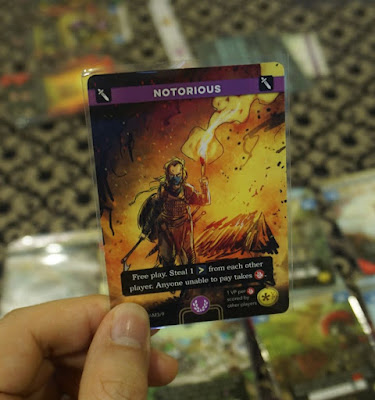
This is one of the Fame cards (purple bar). This one happens to be an attack card too (sword icon). It robs victory point markers from your opponents.
This is the card at the bottom of the Fame deck. It cannot be claimed. You can only use its ability. Once any player uses it, the game ends after the following round.
There are a few other ways the game ends. If any player develops all his development cards, the game ends. If the common deck runs out, the game ends too. In all these cases, victory is determined by victory points scored. Another way the game can end is when the stack of unrest cards runs out. This represents human civilisation collapsing and we all descend into chaos. The player with the fewest unrest cards wins.
In Imperium: Classics every faction has its own character. In general you keep advancing your faction, improving your abilities and gaining more and more new ways to score points. The factions have different strengths and weaknesses. Depending on the combination of factions in play, you will have a different play experience. You have to balance between defending against your opponents' strengths and utilising of your own strengths.
The Play
I played with Han and Allen. Han had played before and taught us the game.
It took some getting used to at first, because it is quite different from typical deck-building games. There are a few new concepts to digest. Almost every card has a unique ability, and the abilities vary widely. There is a lot of text to read. The game is very much about understanding the strengths of your faction and making good use if them. There is not a lot of player interaction. When I planned how to grow my nation, I didn't need to watch the others closely. The most I spent attention on about my opponents was their attack cards. I needed to either develop the ability to block them, or prepare what they were going to rob from me. Now this sounds dumb. Why would I meekly produce resources and prepare them for the robbers? The thing is if I were to run out of resources, I would instead have to take an unrest card, which is usually a worse fate. I'd rather just pay tribute. Just take the money and go. There isn't much I can do to stop others from progressing, other than the occasional attack card.
Progress is what you will be constantly obsessed with. You know once you become an empire, you'll get access to better cards and more scoring opportunities. There is always the incentive to keep your deck thin, so that you can cycle quickly. Fame cards are important because they give you points. They will also affect your play because often the points you receive from them depends on how well you fulfil certain criteria.
We played two games back to back, trying out different factions. I played the Romans in the first game, a faction suitable for beginners because it is straight-forward. The Romans scored points for having high population, so I focused on that. Han was the Vikings, and he kept raiding us, stealing resources. One unique aspect about the Vikings is they would never advance to become an empire. If they get to that situation, the game ends instead. Allen was Carthage, and he was good at accumulating resources.
In the second game I was the Scythians, Han the Greek and Allen the Celts. The rulebook advised that the Scythians should expand and get many region cards, and I obediently heeded that. My ability allowed me to score points for resources accumulated. I had two cards which produced resources based on the trade icons on my region cards. When I had enough such icons, I regularly produced resources and stockpiled them. Later in the game I found that one of the nation cards added to my deck allowed me to score points for region cards. No wonder the rulebook game me such advice.
I had many nation cards, which meant there was much work to be done to go through them to become an empire. Thankfully although I bought many region cards, they could be played onto the table and didn't clog my deck. My deck remained thin.
Allen's situation was the opposite. The Celts were good at buying leaf (uncivilised) cards, and he used that ability frequently, growing his deck. That slowed his progress. Whenever he bought a leaf card, he forced Han and I to take unrest cards. That was a pain in the neck for us.
One disadvantage of my Scythians was they would only get their Glory card after becoming an empire. I had no way to claim Fame cards when I was still in the barbarian state. Progressing towards the empire state was crucial to me. Han's Greek faction had a thin nation deck, which meant he could become an empire quite early. When he had to place the 1VP markers onto common cards, he usually placed them on empire cards (blue icons), because he knew Allen and I were not able to use them yet and would not likely want to buy them yet.
This is what a 3-player game looks like.
One of the Roman cards - Bread & Circus - is very handy. It can return two unrest cards per turn!
These were the cards buried beneath my faction card by the end of the game. Those with a golden circle at the bottom right corner are cards which scored points.
The card on the right is the Scythian faction card. You identify factions by the colour at the bottom left corner.
The Scythians tend to have many region cards (yellow bar).
I love the art style in the game.
This was the Scythian card which scored points based on the number of region cards, 1VP for every two region cards.
By game end I had 14 region cards. One had just been returned to my hand because I had just used it for defense.
This was Allen's Celts faction card, which gave Han and I much headache.
The Thoughts
Imperium: Classics is a game with character. It is different from typical deck-building games. When I played it I felt this was a game with heart. It felt slightly clunky at times, but there is uniqueness. This is your quirky and friendly neighbourhood bartender, not the clean-shaven and slick superstar salesman. Right out of the box you already have eight factions to play with. That's good value for money.
There is not a lot of player interaction. Depending on your preference this can be good or bad. Unlike Through the Ages, you are not regularly comparing military strength, science level etc. Player interaction is mostly in the form of the occasional attack actions. In theory you do compete for the common cards. However in practice I find that since we don't buy cards all that frequently, this aspect doesn't feel very competitive. Most of the time I am just focusing on my hand of cards and developing my own nation.
I like how the factions are constantly progressing, getting more and more abilities. I see this game as a race game as well. You do want to maintain good progress so that you get access to stronger cards and more scoring opportunities. How to fine-tune your deck and whether to keep cards for your next turn are questions that will keep you engaged.
You do have to play to your faction's strengths. That somewhat constrains you. However you do have some freedom for creativity through augmenting your deck with common cards. That creates some variability even when you play the same faction. The faction card has two sides, one more challenging than the other. This too helps.




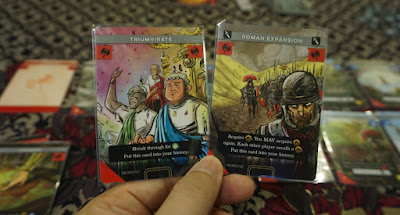
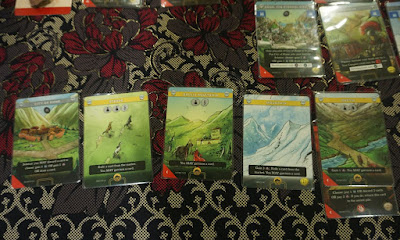
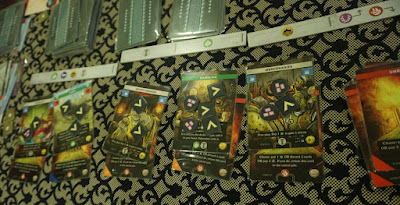
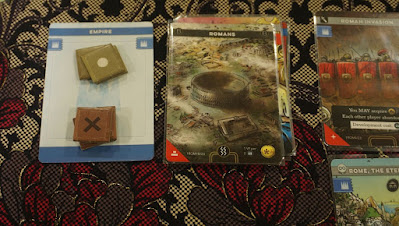




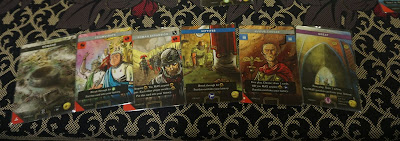


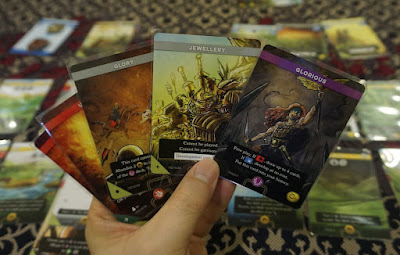

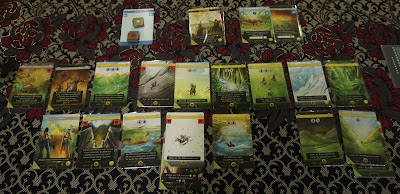

No comments:
Post a Comment